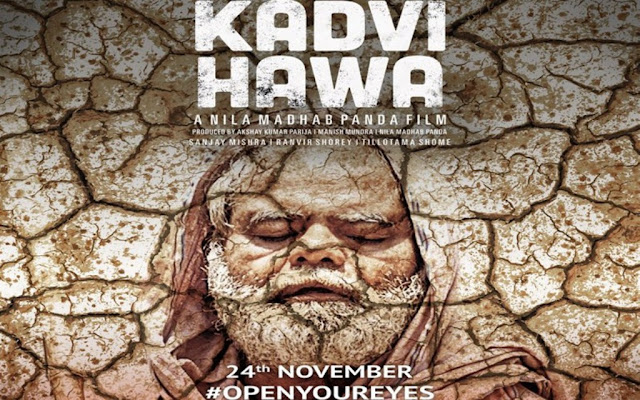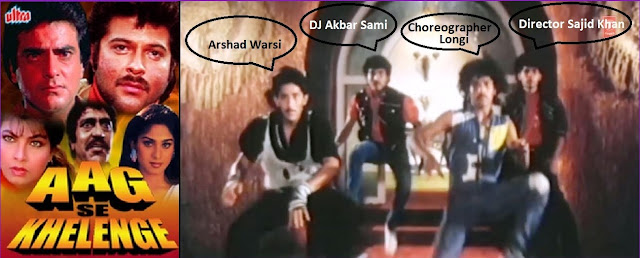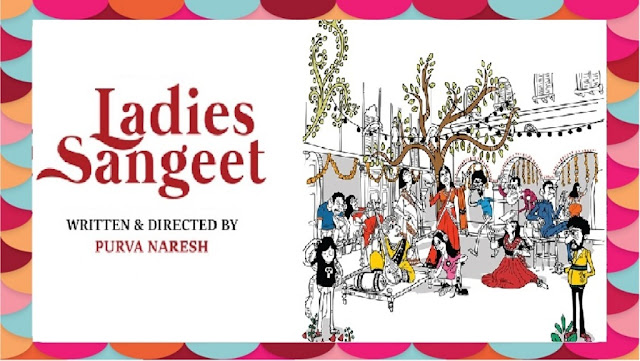Movie Review - Kadvi Hawa – by Suhel Johar
Kadvi Hawa Is An Impressive Film Dealing With Issues Like Global Warming And Climate Change.
Directed by National Award winner Nila Madhab Panda Kadvi Hawa is about global warming and its harmful effects. Based on true stories the film is an eye-opening portrayal of the suffering of people and gives a wakeup call to the society which seems still unprepared to face the consequences of their actions on climate change. Based on true stories, Kadvi Hawa is a bitter pill that reminds one about the dark winds of change. Global warming and climate change are real and are caused by human activity. Despite not showing any such activity that is destroying the civilization, the film makes a heartfelt point in a straightforward way. It speaks about the state of the environment, the destruction of our civilization, the plight of the farmers and of the people living in coastal areas.
Based in the ravines of Mahua in Bundelkand Kadvi Hawa tells the story of a blind man
named Hedu (Sanjay Mishra) and Gunu Baba (Ranvir Shorey). Hedu is a blind
father of a farmer who has taken a big loan from a bank which he is unable to
repay. Gunu Baba is a bank loan recovery agent who comes to their village as he
gets double commission from the drought hit village. Hedu lives with his son Mukund (Bhupesh Singh)
and his family comprising of his wife (Tillotama Shome) and two daughters -
Kuhu (Ekta Sawant) and Pihu. They live a
hand-to-mouth existence. His companion is Anapurna - the Buffalo.
As a concerned father Hedu heads to a micro-finance
bank in a nearest town to check the amount his son, Mukund owes the bank. When
he realises that the debt has doubled due to accumulating interest Hedu lives
in constant fear that his son Mukund might commit suicide because of his
inability to pay back his loan. To get his only son out of this debt trap Hedu
befriends Gunu Babu, the loan recovery officer, who is also referred to as
Yamdut, the God of death, as there have been cases of farmers committing
suicide after being pursued by him.
Hedu makes a unique deal with Gunu Baba so that his
son is saved from kadvi hava or bitter wind in the village. Hedu guides Gunu in
recovering the loans from other debt-ridden farmers. But soon realisation dawns
on him, when Mukund goes missing. Guilt-ridden Hedu then laments, that the
winds of change have already engulfed them. That’s all one can tell you about the film’s
plot.
Director Nila Madhab Panda is known for his
documentaries that address environmental issues. His feature films credits
include critically acclaimed films like I
Am Kalam, Kaun Kitne Paani Mein and
Jalpari. With Kadvi Hawa he takes on the issue of climate change that not only India
but the entire world is worried. The plot of Kadvi Hawa unfolds in a simply witty and satirical manner
especially when Hedu interacts with his curious granddaughter Kuhu. This is
simply evident in practically every scene with her. Watching them interact is
really amusing, especially when he attributes his source of information to the
wind. The plot unfolds in a simply witty and satirical manner especially when
Hedu interacts with his curious granddaughter Kuhu. This is simply evident in
practically every scene with her. Watching them interact is really amusing,
especially when he attributes his source of information to the wind.
Kadvi
Hawa
mainly works because the problem of global warming is never thrown at your
face. Besides global warming and climate change the director has also touched upon
the issue of farmers’ suicide in the drought and flood-hit areas. There is no
unnecessary background music or over-dramatic scenes. The story moves at a good
pace and keeps you interested. Unlike many other films, it stays away from
conveniences and tries to show the real, disturbing picture. The true stories
that are featured in the film are from drought prone Bundelkhand region and the
vanishing villages from coastal Odisha and Chambal region of Dholpur,
Rajasthan. The film won a Special Mention at the 64th National Film Awards held
on April 7 2017.
Nila Madhab Panda deserves all the credit for taking
up the issue and drawing the attention of the people with a film that needs to
be seen by all. Nila Madhab Panda along with his co-writer Nitin Dixit has done
a fabulous job as the writers of the film. Cinematography by Ramanuj Dutta
captures the terrain and the finer nuances of every actor with detailed
accuracy. Jabeen Merchant’s editing is good though it could have been better. The
only song Main Banjar which comes in
far end of the narrative suitably conveys the essence of the film. The
background score by Santosh Jagdale is inspiring and hits the right notes.
Performancewise, Sanjay Mishra is brilliant with his
down-to-earth, natural performance. You experience his anxiety and pain as Hedu.
He is aptly supported by Ranvir Shorey who has played his part as the
frustrated Gunu, exceptionally well, Bhupesh Singh as Hedu’s son Mukund,
Tillotama Shome as Hedu’s concerned daughter-in-law and Ekta Sawant as Hedu’s
chirpy granddaughter Kuhu and the rest of the cast add a distinct flavour to
their characters.
On the whole, Kadvi
Hawa is definitely worth a watch for not only its theme but some powerful
performance.




Comments
Post a Comment